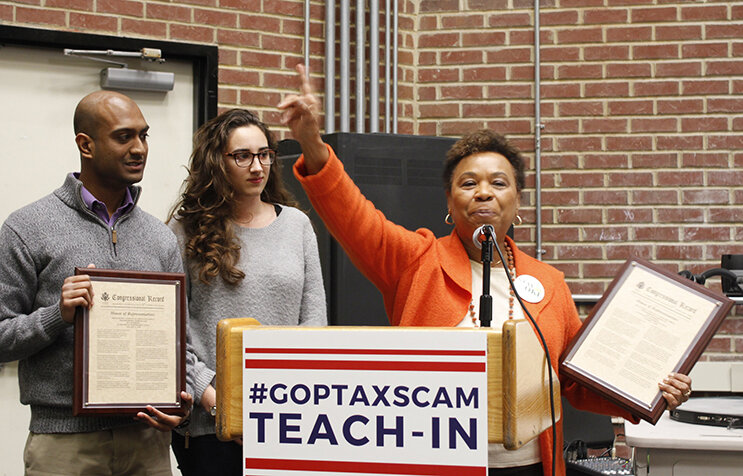
I have been involved in the science policy space since 2017. I am currently a 2025-26 AAAS Congressional Science & Engineering Fellow.
During grad school, I was an active member of the Science Policy Group at Berkeley, of which I served as President for a year, and the National Science Policy Network. Keep scrolling to read about some of the exciting things I worked on as a student and postdoc!
Fighting against the graduate student tax.
In November 2017, the House of Representatives proposed sweeping legislation to overhaul the US tax system. Included in their proposal was a clause that would eliminate the deduction for qualified tuition and related expenses. In other words, graduate students who have their tuition paid externally (for example, by TA or RA positions) would be expected to pay taxes on the value of this tuition. Annual tuition can be as high as $50,000, or more than a typical graduate student’s salary, so this extra taxable income would be a significant burden on most students.
I wrote an analysis of this legislation in which I calculated its financial impact on various students. I determined that a Berkeley student could see their tax bill go up by 30-60%, while a student at a private institution like MIT could see their taxes go up by a staggering 240%. Then, Kathy Shield—then a Ph.D. student in Nuclear Engineering at UC Berkeley—and I made a spreadsheet calculator where students could determine their individual tax burden if the bill were passed into law.
The analysis and calculator quickly went viral. Dozens of news outlets covered these tools, including the ones listed above (see a full list here), and Kathy and I were bombarded with interviews. We don’t know exactly how many people accessed our tools, but it was at least in the tens of thousands. It was fun! But more importantly, we saw a national movement arise as grad students around the country realized what was at stake. Students organized, holding phone banks to call their representatives, coordinating rallies to draw support and attention to the issue, and writing op-eds in local and national outlets.
Eventually, our efforts were successful! The grad tax was removed from the final legislation, and grad students around the country could rest easy.
Advocating for federal funding of science.
In April 2024 and April 2025, I traveled to Washington, D.C. to learn about the appropriations process and advocate for continued federal funding of high-energy physics research. I was part of a coalition of over 70 high-energy physicists who met with members of Congress to request support in FY25 and FY26 appropriations for the Department of Energy (Office of Science) and National Science Foundation. I met with over 15 Congressional offices to describe the coming decade-plus of HEP research and ask for their support in appropriations. I also met with Congressional appropriations and authorization subcommittees for in-depth conversations about the HEP program and required budgets. Finally, I met with Executive branch agencies to discuss the HEP program.
Bringing together scientists of different expertise.
From October 2019 - March 2020, I helped organize a series of forums and policy discussions designed to bring together natural scientists and social scientists on pertinent issues.
In October 2019, the Science Policy Group at Berkeley was awarded a microgrant by Research!America to address the question of “Science Meets Science”: a synthesis of social and natural science. We chose three topics that rely on STEM, social science, and public policy: Wildfires, Genetically Modified Organisms, and Artificial Intelligence.
I was one of the lead organizers—with Erin Sullivan and Sarah Hartman—of the GMO module. We targeted our events around the use of GMOs for agriculture, such as corn, soybeans, rice, and maize. The scientific consensus is that they are safe, and indeed can offer advantages like disease-resistance or nutritional benefit, but GM crops are controversial in many communities. We brought together two GMO experts for our forum: David Zilberman, Professor of Agricultural & Resource Economics, and Sarah Hake, Professor of Plant & Microbial Biology and Center Director of the USDA Plant Gene Expression Center. Both our speakers agreed that GM crops are beneficial to society, particularly in low-income developing nations, but they approached the question from different perspectives. We also led a roundtable in which we brainstormed the many ways that GMOs intersect aspects of public policy: climate, food security, nutrition, health, intellectual property, and economics, just to name a few.
Writings and Presentations
Below, I have listed several pieces I have written (or co-written) and presentations I have given in the area of science policy.
Velan, Woods-Robinson, Case, Warner, Poppiti, Abramowitz. The Federal Science Project: A Scientist in Every Classroom. Journal of Science Policy & Governance, August 2021. [link]
Jackson, Velan, Livingston, Lee, Huynh, Eckert. Regulation of Facial Recognition Systems at the Municipal Level. May 2020. [link]
Hartman, Horner, Jackson, Kovak, Velan. Streamlining USDA Regulation of Gene Editing to Benefit US Agriculture. Journal of Science Policy & Governance, September 2020. [link]
Saintsing, Stoudt, Velan. CRISPR Consensus? Berkeley Science Review, January 2020. [link]
Lee, Sullivan, Velan, Yu. Bridging the culture gap between science and policy. Berkeley Science Review, July 2019. [link]
Lee, Sullivan, Velan, Yu. Catalyzing Advocacy in Science and Engineering: Lessons Learned. Berkeley, CA, May 2019. [link]
Sullivan, Jackson, Broberg, O’Dair, Velan. California Lawmakers Should Take Action to Mitigate the Effects of the 2019 PG&E Bankruptcy. May 2019. [link]
Election Quality Control. Berkeley Science Review, April 2019. [link]
Engaging in Public Policy as a Scientist. Grounds for Science - Berkeley, CA, April 2019. [link]
The Mathematics of Gerrymandering. Graduate Student Seminar - Berkeley, CA, March 2018. [link]
How Does the “Tax Cuts and Jobs Act” Affect Ph.D. Students? November 2017. [link]


